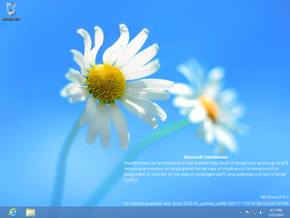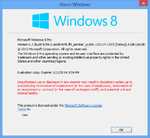Windows 8.1 build 9299 (fbl_partner_out06.130117-1707)
| Build of Windows 8.1 | |
 | |
| OS family | Windows NT |
|---|---|
| Version number | 6.2 |
| Build number | 9299 |
| Build revision | 0 |
| Architecture | x64 |
| Build lab | fbl_partner_out06 |
| Compiled on | 2013-01-17 |
| Expiration date | |
| Timebomb | 2014-01-15 (+363 days) |
| About dialog | |
Windows 8.1 build 9299 (fbl_partner_out06.130117-1707) is the sixth partner release of Windows 8.1, which was originally uploaded to BetaArchive on 30 March 2019 as a checked/debug compile. The free/retail compile was later shared on 3 November 2024.
Editions and keys[edit | edit source]
| Edition / SKU Name | Key |
|---|---|
| Core | 2H7NK-3VJJY-HHY3Y-WM3T8-JFCRY |
| Professional | MTWNQ-CKDHJ-3HXW9-Q2PFX-WB2HQ |
| ProfessionalWMC (edition upgrade only) | MBFBV-W3DP2-2MVKN-PJCQD-KKTF7 |
New features and changes[edit | edit source]
Hyper-V Generation 2 virtual machines[edit | edit source]
Preliminary support for Hyper-V Generation 2 virtual machines, which utilize UEFI firmware in place of legacy BIOS, include support for the Secure Boot protocol and virtual Trusted Platform Modules, has been implemented, although the underlying work is largely unstable; possibly because the implementation itself has not been advanced further yet at this point or likely due to the hypervisor hitting an assertion failure (as the operating system was compiled under a debug release type).
In this build, generations are internally referred to as "types", and there is no graphical user interface present for creating such virtual machines. A Generation 2 virtual machine can be created by utilizing the below sample PowerShell commandlet, which sets the virtual machine's memory to 2 gigabytes, creates and uses a 32-gigabyte VHDX disk image, and sets the generation to "Type 2":
New-VM -Name "Type 2 VM" -MemoryStartupBytes 2GB -NewVHDPath "X:\Path\To\VHDX\Image.vhdx" -NewVHDSizeBytes 32GB -Type Type2
Miscellaneous[edit | edit source]
- Setup environment's autorun window borders have been enlarged.
Bugs[edit | edit source]
Blank screen on boot[edit | edit source]
This build often boots up to a blank screen after logging in, instead of loading the start screen directly. Pressing the ⊞ Win Key can load the start screen and allow the user to continue.
Windows Recovery Environment[edit | edit source]
The Windows Recovery Environment user interface will crash while attempting to load the initial boot options menu page, in turn causing unexpected restarts.








